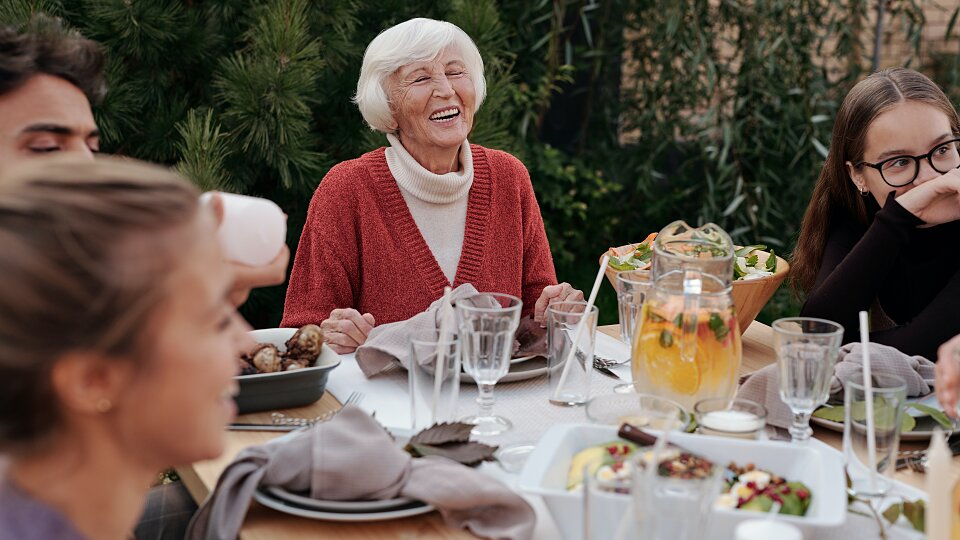Tips and resources for facing an Alzheimer's diagnosis
September is World Alzheimer’s Month. Every year, there is an opportunity to learn more about the most common type of dementia. According to the Alzheimer’s Association, there are more than six million Americans 65 and older facing this disease today.
Today, Cheryl Johnson, director of healthcare services with Buckner Retirement Services, shares a few ways families can adjust to a new or progressing Alzheimer's diagnosis.
I remember the day my grandmother was diagnosed with Alzheimer’s disease (AD), and I remember my mother’s relief and palpable fear when the diagnosis was confirmed. These feelings are not unique to my family; they are common in families facing this diagnosis. AD affects the entire family and their loved ones. To cope with the challenges of AD, self-care, self-awareness and some knowledge of AD are vitally important.
When you suspect your loved one may have AD, it is important to see a physician or other medical provider to rule out other things that could be causing symptoms such as depression or another mental illness, urinary tract infections or other infections, changes in hearing or vision, side effects of a medication or brain malignancy.
As the adage goes, “When you’ve met one person with AD, you have met ONE person with AD.” While AD symptoms can vary from person to person, there are predictable changes as the disease progresses.
Here are a few things that support those facing Alzheimer's disease:
- Keep a regular routine and a healthy diet.
- Avoid over-stimulation. Simplify the environment.
- Be aware of times when your loved one tends to be fatigued and plan for rest times. Likewise, plan outings such as a trip to get groceries or ice cream during times your loved one tends to be rested.
- Have a realistic expectation of what your loved one can and cannot do.
- Celebrate moments of joy! There are many if you look for them.
- Encourage your loved one to help with chores; one woman continued to set the dining table despite advanced dementia. It doesn’t matter if the silverware isn’t perfectly placed. That is small compared to the meaning and purpose this task provided.
- Reassure your loved one; as troubling as it is to love someone with dementia, it may be more difficult to be the person with dementia who does not recognize familiar surroundings.
- Give reasonable choices, for example, “Would you like an apple or a banana for your snack?” rather than, “Would you like to go home or would you like to go to see the doctor?”
- Provide “win-win” choices. A friend pared down her mother’s wardrobe to outfits that would go together no matter what she chose. Her mother had the choice of varied tops to go with navy or khaki pants.
- Bring family scrapbooks or other treasured items that may engage your loved one with memories. These provide great conversation starters as you visit with your loved one.
- Sing old songs together: gospel hymns or other familiar songs can bring significant comfort.
- A familiar quilt or blanket or other items can provide reassurance.
- Avoid arguments; these will lead to frustration for both of you. If your loved one believes the sky is purple, what is the harm? Oftentimes redirection will help to lessen the tension.
- Validate his/her reality; if he/she thinks it is 1950, go with it. She may think her deceased spouse is still alive; rather than confronting this reality, perhaps you can engage her in talking about fun times they shared together.
- Remember your loved one is an adult with a disease; resist the temptation to relate with “parenting” behavior or attitudes.
- When difficult behaviors arise, check to see if your loved one is hungry, thirsty, in pain or needs to go to the bathroom. This accounts for many behaviors. A nurse friend, Debbie, worked on a dementia behavior unit; she worked with the medical director to provide Tylenol to those whose difficult behaviors tended to escalate in the afternoon. Amazingly, many behaviors were resolved or significantly lessened.
As the disease progresses, there may come a time when your loved one does not recognize you; perhaps, the person with Alzheimer’s disease believes her children are still young and needy. Other times, he/she may call out for “mother,” and he/she wants the mother remembered from childhood.
Caregivers need support too
These times can be devastating. It is crucial you talk with trusted friends, family, counselors or clergy as you walk through this difficult time. Many churches and other organizations offer support groups.
There are a plethora of books and videos online that can serve as a resource. The Alzheimer’s Association has many resources available on their website. You are not alone in your feelings. Take time to tend to your own needs: keep a routine, get adequate rest, take time for hobbies you enjoy.
When the time comes that safety is a concern or a caregiver is no longer able to care for their loved one, families frequently begin looking for long-term placement for their loved ones.
Support is available through Buckner senior living communities
Each Buckner Retirement Services’ location (Austin, Beaumont, Dallas, Houston, Longview, and San Angelo) has a memory care assisted living community. These offer both respite and long-term placement, and you can find solace knowing your loved one is in a safe place and will be tended by caring, knowledgeable associates. Additionally, each community has a chaplain who can pray with you. We are here to support you and walk with you as you face this difficult time.




Add a Comment